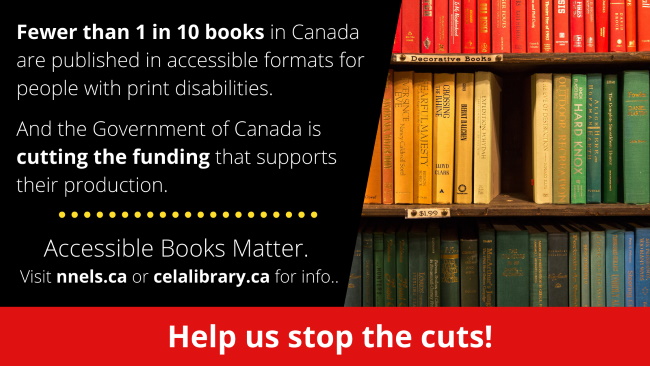
Advocating for Continued Funding for Accessible Reading Materials
March 15, 2021
Earlier this month, the Centre for Equitable Library Access (CELA) and the National Network for Equitable Library Service (NNELS) launched an advocacy campaign to reverse a planned elimination of federal funding for their programs over the next four fiscal years.
From NNELS:
Without warning or consultation, the federal government announced in its 2020 Fall Economic Statement that it would withdraw the current $4 million which supports accessible reading materials and programs, ending all support by 2024-2025. This $4 million funding is split between CELA ($3 million annually) and NNELS ($1 million annually) to provide material to those across Canada with print disabilities.
More information, including advocacy tools, is available from the CELA and NNELS websites:
Centre for Equitable Library Access (CELA)
- We need your help!
- What you can do
- How to contact your MP
- What to say when communicating with MPs
- Facts and Figures
- Frequently Asked Questions
National Network for Equitable Library Service (NNELS)
March 16, 2021 Update
Today, the Minister of Employment, Workforce Development and Disability Inclusion, Carla Qualtrough announced an additional $1 million under the Social Development Partnership Program – Disability component, to support the activities of the NNELS and the CELA in providing accessible reading materials to persons with print disabilities across Canada. This announcement is in recognition that the pandemic has had a profound effect on the accessible publishing industry, and the significant need for access to print materials, as individuals are more isolated than ever.
CELA and NNELS’ Joint Response to Minister Qualtrough’s Announcement
We thank Minister Qualtrough for her assistance and are grateful for the one year reprieve this funding offers for our users who rely on accessible reading materials. In our conversation with Minister Qualtrough yesterday we agreed that there needs to be an ongoing discussion with all stakeholders, including the publishing industry, the federal government and others, to develop a longer term strategy and sustainable Federal funding solution for accessible book production and distribution. We are also seeking her assurance to address the government’s planned funding cuts for future years while we work together to develop a strategy to meet the needs of the 1 in 10 people with print disabilities.
Library Community Response
Atlantic Provinces Library Association (APLA): An open letter to Minister Freeland regarding the de-funding of CELA and NNELS (March 15, 2021)
Canadian Urban Libraries Council (CULC): Cuts to CELA & NNELS Funding
Political Coverage
House of Commons Debates (Hansard): March 12, 2021
Persons with Disabilities
Ms. Raquel Dancho (Kildonan—St. Paul, CPC):
Madam Speaker, in 2018 the Liberals attempted to cut $2.5 million from the Canadian National Institute for the Blind’s accessible book program, but the disability community fought back. Non-profits NNELS and CELA now administer the program and provide three million Canadians who have reading disabilities with access to books and resources at no extra cost to them.
This year, in the middle of the pandemic, the Liberals plan to cut $4 million from NNELS and CELA. These organizations provide access to Braille, audio books and other accessible reading materials to Canadians with disabilities. This cut is just wrong.
Will the minister commit to restoring their funding, yes or no?
Mr. Irek Kusmierczyk (Parliamentary Secretary to the Minister of Employment, Workforce Development and Disability Inclusion, Lib.):
Madam Speaker, we strongly believe that everyone should be able to access information and reading material. That is why we signed on to the Marrakesh treaty four years ago and why we have been working closely with all stakeholders, including disability groups and the publishing industry, on an agreed-upon plan to transition the industry to one in which books are born accessible.
We know that the pandemic has impacted the timeline and the realization of this transition and we are working with stakeholders to ensure that they are supported and that alternate-format materials remain available. I am confident that we will find a solution—
Mr. Alex Ruff (Bruce—Grey—Owen Sound, CPC):
Madam Speaker, he did not answer the question.
Many seniors across Canada are like my 98-year-old grandmother, living in long-term care homes with limited social and family contact that has been further reduced by the pandemic. Many have visual impairments or are legally blind. They are dependent on much-needed accessible reading materials that are provided through the CELA and NNELS organizations.
This is even more critical in rural Canada, where access and resources are limited, yet the Liberal government has decided to cut $4 million in essential funding for them. Why? My 98-year-old grandmother and millions of Canadians want to know.
Mr. Irek Kusmierczyk (Parliamentary Secretary to the Minister of Employment, Workforce Development and Disability Inclusion, Lib.):
Madam Speaker, as I stated prior, we strongly believe that everyone should be able to access information and reading material. I am confident that we will find a solution that keeps us on the path to accessible publishing and we will continue to work with our partners in the disability community to make sure that we have a barrier-free and accessible Canada.
Press Coverage:
- Quill & Quire: Future uncertain for accessible book providers CELA, NNELS after “one-year reprieve” from total funding cuts (March 17, 2021)
- The Early Edition with Stephen Quinn (CBC Vancouver): The work behind making reading accessible (March 15, 2021)
- Global News: Advocates call for reversal of funding cuts for books for people with disabilities (March 8, 2021)
- CBC News: Advocates urge Liberals to cancel ‘devastating’ cut to services for Canadians with print reading disabilities (March 7, 2021)
- Kelly and Company: Accessible reading material in jeopardy? (March 5, 2021)
Add a new comment